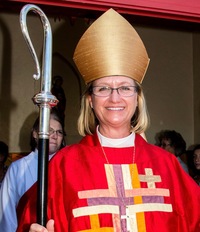by Bishop Mary-Gray Reeves
The Episcopal Diocese of El Camino Real
I have asked the question a lot lately, "How do our values translate into action?" It's a question that arises during the defining moments that inevitably come our way in life; those events that are transforming to the point where we are confronted with who we are, what we believe, and how we live out our values in the world. Our values can be clarified, strengthened and empowered as a result of having to wrestle with ourselves.
I was ticketed for speeding a few months ago. I clearly had decided that my right to drive beyond the speed limit on an unpopulated road was more important than the reason the speed limit in that location was determined in the first place. I slogged through traffic school and the obvious was repeatedly stated: laws were in place to keep us from harming ourselves and others.
It puzzles me - it terrifies me - that we can place limits on how we use a cell phone in a car to save lives, but cannot freely and willingly work toward boundaries to lessen the capacity of another to exercise deadly rage.
How will our values be clarified, strengthened and empowered because of Orlando? We don't know all the details yet of the shooter's disposition. He could have been an Islamist terrorist or a GLBTQ terrorist. He was plagued in some way and disposed toward raging violence. It is our reality that people are in our midst who do such things.
Such events call us to consider our responsibility to one another. For me, questions arise. Is my right to bear certain weapons of more value than those who died? Is the lack of social responsibility taken in this country for the mentally ill of more value than those who died? None of us are free from guilt in these events. As citizens and residents in these United States, as Christians, each mass shooting says something about who we are. What are the words we would use to describe ourselves in these days?
In our Gospel on Sunday - the story of the Geresene Demoniac - I have wondered how long the conversation goes on between Jesus and the demons who inhabit the man. He was plagued for so many years. This one is complex. They aren't leaving without a fight. A strategy must be organized. Where will the demons go? Where will the man go? This was not a quick, "drive-by" healing. It would take some time. I was struck that at the end of the story Jesus tells the man to thank God for what God has done for him; instead, he proclaims what Jesus has done for him. I think the distinction speaks of the power of the incarnation; that God was known in who Jesus was and what he did. For we who follow Jesus, it reminds us that God is known in who we are and what we do.
Perhaps the man was so grateful that Jesus did not leave when it became apparent that the conversation would be complex and take time. There was nothing more important to Jesus in this moment than this "demoniac." Perhaps this gentle, healed soul was so deeply thankful that Jesus kept working at it until the work was done. Jesus stays through his terror.
How might we walk alongside our bereaved families and our traumatized nation? Can we stay in these long conversations as we sort through polarized viewpoints? Can we find common ground for our values that can translate into life and goodness for us all?
Several weeks ago we held a diocesan conference on Living Room Conversations: how to have constructive conversation to find common ground on difficult issues. Gun control, racism, homophobia, sexism, misogyny and health care are a few matters on which we disagree in this nation, reflected in the Orlando terror. I've strongly encouraged our congregations to use the Living Room Conversation process to engage in the Christian stewardship of relationship and conversation.
Mass shootings offer us an opportunity not only for more arguing, but for reconciliation and grace. Which will we choose? We struggle with our differences, and yet it is precisely in our differences that we can find creative solutions.
Please know that I am aware of my own bias and values in these and other pieces I have written following mass shootings. Part of my call as a bishop is to share what I think, and also to teach. However, my role as a gatherer is equally important. I hope that the Living Room Conversations process can provide a space to talk about difficult topics together, despite disagreement. Confident in the grace of God, may we consider one another's views and discern our role in creating solutions that value the dignity of all human life.
O God, as the Body of Christ, may we remain with one another and with the angry, traumatized and broken heart of our nation. As we seek justice and change that reflects your will, may we trust one another as we responsibly speak our values - so that in faith, we may take our place in your powerful and healing presence intended for all. It is in the power of the Spirit we humbly pray. Amen.
+Mary
The Rt. Reverend Mary Gray-Reeves is Bishop of the Episcopal Diocese of El Camino Real, which spans 43 churches from California's Silicon Valley to the Central Coast. Born and raised in Miami, Florida, Gray-Reeves was ordained as the diocese's third bishop in November 2007. She is author of Unearthing My Religion and co-author of The Hospitality of God with Michael Perham. Both publications reflect her passion for sharing the Christian faith in relevant ways in our complex and rapidly changing world.

